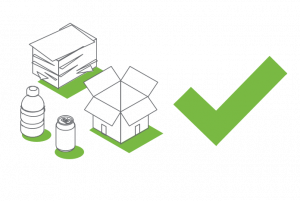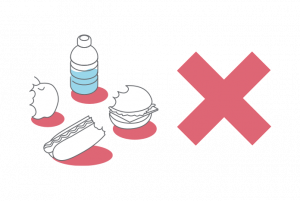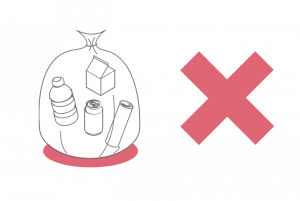- About Ramapo
- Academics
- Admissions & Aid
- Student Life
- Athletics
- Alumni
- Arts & Community
- Quick Links
- Apply
- Visit
- Give
Recycling Checklist
GENERAL CAMPUS REFUSE REMOVAL PROCEDURES
Recycling Pick-up Schedule for Village and CPAs, Fall 2024
RECYCLING 101
If you’re wondering how Ramapo College deals with trash and organic waste, and how to recycle properly, use this checklist to help us most effectively manage our trash stream.
- GENERAL CAMPUS REFUSE REMOVAL PROCEDURES
- HOW TO RECYCLE: USE THESE THREE RULES TO RECYCLE RIGHT
- WHAT CAN BE RECYCLED: RECYCLING GUIDE
- NON SINGLE-STREAM RECYCLABLES
- COMMON RECYCLING MYTHS
- RECYCLING RESOURCES
- To learn more, visit wm.com/recycleright
HOW TO RECYCLE: USE THESE THREE RULES TO RECYCLE RIGHT
It’s time to get back to the basics. The fact is that some recycling actions make a bigger impact than others. So please remember these three basic rules the next time you recycle.

Recycle clean bottles, cans, paper and cardboard.

Keep food, food scraps and liquids out of your recycling.

No loose plastic bags and no bagged recyclables.
And don’t forget, you should never place an item in your recycling container if you’re not sure it’s an approved recyclable. When in doubt – throw it out.
©2020 WM Intellectual Property Holdings, L.L.C.
WHAT CAN BE RECYCLED: RECYCLING GUIDE
To find out more, please reference these guidelines and common myths based on science, research and collaboration with industries, agencies and other organizations. Click here for a downloadable version and help spread the word about what is or isn’t recyclable and why.
ACCEPTED IN RECYCLING
These items can go in your recycling bin, as long as they’re clean and dry.
Plastic Bottles & Containers
Recycle plastics by shape: bottles, jars, jugs and tubs. The “chasing arrows” symbol doesn’t necessarily mean it’s recyclable.
Clean and dry containers, then put the cap back on before tossing in the bin.
Food & Beverage Cans
Recycle empty tin, aluminum and steel cans.
Empty aerosol cans are also recyclable. If the can has a plastic lid, remove it before recycling.
Paper
Paper, newspaper and magazines are good to recycle.
Flattened Cardboard & Paperboard
Flatten and recycle all cardboard and paperboard.
Cardboard pizza delivery boxes without grease, leftovers or liners should be recycled; but leftover crusts, cheese and other food should not.
Food & Beverage Containers
Recycle empty milk cartons, juice boxes and food cartons.
Glass Bottles & Containers
Recycle empty glass bottles and jars.
Broken glass should be placed in the trash.
NOT ACCEPTED IN RECYCLING
Try to reduce and reuse these items instead of putting them in the trash.
No Bagged Recyclables
Do not bag recyclables. They must be loose in the bin.
Do not bag recyclables as materials inside may not get recycled.
No Plastic Bags
Plastic bags are not accepted as part of our recycling program – they get tangled in equipment and threaten recycling worker safety.
Reuse plastic bags, or learn where you can recycle them at plasticfilmrecycling.org.
No Plastic Wrap & Film
Plastic wrap, bubble wrap, sandwich bags and freezer bags should not go in the recycle bin.
Reuse whenever possible for presents, moving, or storage of similar items, or look for local options to recycle.
No Flexible Packaging
Flexible packaging like chip bags and juice or soup pouches cannot be recycled in curbside programs.
This type of packaging is made from multiple materials preventing it from being recycled.
No Cups with Wax or Plastic Coatings
Cups with plastic or waxed coatings are not recyclable. The plastic lids and straws should be trashed as well.
Invest in and carry a reusable cup instead.
No Polystyrene Foam and Plastic (#6)
Polystyrene foam, plastic “to-go” containers and cups are made of non-recyclable materials, and are not acceptable in the curbside recycling program.
Packing peanuts aren’t recyclable either, however some shipping stores will take peanuts back for reuse.
©2020 WM Intellectual Property Holdings, L.L.C.
NON SINGLE-STREAM RECYCLABLES
Toner and Ink Cartridges – Contact the Storeroom (x7670) for pickup.
Batteries – Receptacle located on the second floor of the Student Center.
Eyeglasses – Collection receptacle located in the HR department.
Electronics – Computers, Mini Refrigerators, Televisions, Audio Equipment, Printers. Contact ITS (x7777) for disposal of computer equipment and put in a work order with the Office of Facilities (x7660) for all other electronic material.
COMMON RECYCLING MYTHS
Grow your recycling IQ by debunking common myths that can help ensure your materials aren’t contaminated and successfully make it all the way through the recycling process and to their next life.
Learn the reality behind the myths to ensure you’re protecting others and the environment by recycling right.
Myth: Most Americans recycle all they can.
Reality: False.
Research shows convenience and commitment are required for maximum recycling. For instance, do you recycle in several rooms of your home? If you only recycle in the kitchen, recyclables in your home office or bathroom get thrown away. So make recycling a collaborative effort where everyone participates, enabling the most recycling of the right materials.
Myth: Recycling arrows on a container mean it is definitely recyclable.
Reality: Only in some cases. Check the table above and local program guidelines to see what’s recyclable and what’s not.
Many plastics cannot be made into new products. Recycle plastics by shape: bottles, jars, jugs and tubs.
Myth: Containers must be squeaky clean in order to be recycled.
Reality: Containers should be clean, but don’t have to be spotless.
While all bottles, cans and containers should be clean, dry and free of most food waste before you place them in your recycling container, they don’t need to be spotless. The goal is to make sure they are clean enough to avoid contaminating other materials, like paper, or your un-lined kitchen recycling bin. Try using a spatula to scrape cans and jars, and putting recyclables in your sink among the dishes you are rinsing to share that same water to rinse and remove residue.
Myth: Even if an item shouldn't go in the bin, it will get sorted anyway.
Reality: False. Non-recyclable items are not accepted curbside.
Non-recyclable items contaminate recyclables. Recyclables stuck inside plastic bags are at risk for never making it through the recycling process. Conversely, recyclable items placed into garbage containers are hauled to a landfill and cannot be recovered effectively. The right thing to do is put the right recyclables in the recycling container and non-recyclables into garbage containers. Recyclables with the greatest impact are bottles, cans, paper and cardboard
Myth: Hoses, tanks, shower curtains, swing sets, etc. are recyclable.
Reality: Just because it’s plastic doesn’t mean it’s recyclable in your recycling program.
If it’s not bottles, cans, paper or cardboard, it probably doesn’t belong in your curbside mixed recycling bin and may even require special handling. Just because an item is made from plastic, or contains plastic parts, doesn’t mean recycling facilities can handle it. There are other resources (e.g., Earth911.org) that can help answer questions about what to do with non-recyclables or household hazardous waste.
Myth: All types of glass bottles and jars are recyclable.
Reality: The acceptance of glass in recycling programs varies by jurisdiction.
Glass recycling collection varies in communities across the U.S. Some communities recycle glass with all other recyclables; some collect glass separately at the curb in its own container; and some cities have specific recycling drop-off locations for glass. Some states, like CA, CT, OR, IA, MI, ME, VT, MA and NY, have ‘bottle bill’ laws that allow for a per-bottle deposit when bottles are brought to return centers or retailers for recycling. Please refer to your community’s recycling guidelines for local program information.
Myth: Aerosol cans are acceptable in the recycling bin.
Reality: It varies by jurisdiction.
Most recycling programs accept empty/dry aerosol cans (without the caps). If the can isn’t empty, it could be dangerous. Some fires are caused in baling machines from trace amounts of can chemicals, and cans with leftover propellant have been known to become projectiles when densified/baled. Waste Management facilities and commodity vendors accept steel, mixed metal and aluminum aerosol packages. Multi-material aerosol packages are not recyclable.
©2020 WM Intellectual Property Holdings, L.L.C.
RECYCLING RESOURCES
Posters, Guides & Other Tools
Learn which materials go into your recycling container and which do not. –
Poster: Most Common Contaminants
Find out which items cause recycling contamination and what to do with them instead.
5 Tips to Get Started Recycling
Follow these 5 easy steps to set up your recycling for success. –
The Three Rules of Recycling Graphic
Simplify your recycling process with 3 simple rules.
Become the expert and uncover the truth about common recycling myths.
Get answers to FAQ and learn why plastic bags are detrimental to successful recycling programs.It’s easier than you think to recycle without plastic bags.
©2020 WM Intellectual Property Holdings, L.L.C.
Container Labels
Affix this label to your recycling bin to remind you what materials are acceptable and non-acceptable for recycling.
Recycling Labels for Each Room
Label recycling containers in multiple rooms with these customized labels for the kitchen, bathroom and office.
Affix this label to your trash bin to remind you what materials must go to landfill. –
©2020 WM Intellectual Property Holdings, L.L.C.
Residence Life Resources
Apartment & Condos Newsletter: Community Pride
Encourage residents to take pride in their community through proper recycling.
Welcome new residents and inform them of community recycling goals. –
Welcome new residents to your residence area or hall and encourage them to take part in the campus recycling program.
©2020 WM Intellectual Property Holdings, L.L.C.
Student Recycling Aide Resources
These factsheets and feedback tools help you gently inform residents how they’re doing in their recycling program and provide helpful tips to keep them on track.
Learn the 3 rules of recycling and how to decipher recyclables from non-recyclables. –
Recycling Feedback Tag – Contamination
Education and enforcement go hand-in-hand for proper recycling. Let residents know when there are contaminants in their recycling.
Recycling Feedback Tag – Good Job
Positive direct feedback is important. Let residents know when they are doing a good job of recycling right.
Recycling Contamination Newsletter
Inform residents of the feedback tag process indicating that there were non-acceptable items in their recycling.
Follow-up email to inform a resident they may have received a Recycling Feedback Tag. –
©2020 WM Intellectual Property Holdings, L.L.C.
To learn more, visit wm.com/recycleright
Ramapo College of New Jersey recognizes the value of publishing on the Internet. The College does not preview, review, censor, or control the content of these pages in any way as a matter of course. This page and Web pages linked from this page are created by the authors, and do not in any way constitute official Ramapo College of New Jersey content.
Copyright ©2025 Ramapo College Of New Jersey. Statements And Policies. Contact Webmaster.

Follow Ramapo Green